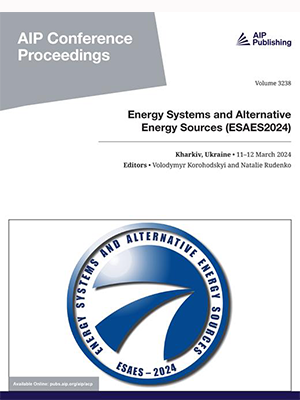
About the Journal
Dear colleagues!
We cordially invite all scientists, research scholars, engineers, industry experts and professionals, entrepreneurs, postgraduate students and students to exchange theoretical research, field experience and empirical findings on energy systems and alternative energy sources during the online conference held at KhNAHU.
The Department of Internal Combustion Engines of Kharkiv National Automobile and Highway University (KhNAHU) hosts the 3rd international scientific and practical conference " ENERGY SYSTEMS AND ALTERNATIVE ENERGY SOURCES ‘2026" (ESAES 2026), which will be held online on March 11-12, 2026 at 04:00 PM Kyiv via ZOOM.
Zoom link:
https://us02web.zoom.us/j/88595685770?pwd=7ogVol0WgcILLwBlOX6h0g5nYaz3yV.1
Conference ID: 885 9568 5770
Access code: 158269
The conference is set up to bring together the academical, scientific and industrial communities from across the world working in power generating technologies and alternative energy sources.
The purpose of the conference is to encourage the sharing of emerging studies, technological innovations and practical experience in developing sustainable, efficient and ecologically clean energy.
The main tasks of the conference:
- dissemination of knowledge: exchanging research and knowledge in power generating systems and alternative energy sources among conference participants.
- stimulating innovations: promoting the development and introduction of pioneering technologies to boost the productivity and sustainability of energy systems.
- facilitating cooperation: creating an international forum to establish contacts and foster collaboration among representatives of science, industry and government.
- solving global challenges: discussing and finding groundbreaking solutions to global issues related to ensuring sustainable energy security and reducing the impact on the environment.
- dissemination of hands-on experience: highlighting empirical studies and successful cases in energy technologies.
Basic information:
- Periodicity - 1 time a year (in spring).
- Working languages: Ukrainian and English.
- Participation in the conference is free of charge.
IMPORTANT DATES
Submission of full-length paper: October 06, 2025
Paper acceptance/revision/rejection notification: January 31, 2026
Revised paper submission: February 16, 2026
Camera ready paper submission: until February 28, 2026
Registration starts: February 20, 2026
Registration ends: March 06, 2026
Conference dates: March 11-12, 2026
POLICY AND ETHICS FOR REVIEWING CONFERENCE PROCEEDINGS
Importance of Peer Review -
Peer review is a key element of the scientific process, contributing to the improvement of the quality of published research. All scholars are expected to participate in this process to ensure objectivity and scientific reliability in publications.
Confidentiality
Manuscripts under review are considered as confidential materials and should not be disclosed to third parties, except in cases requiring consultation with other experts, which should be reported to the Editorial Board. It is prohibited to submit manuscripts using language models of artificial intelligence due to the lack of data security guarantees.
Objectivity and Professionalism
Reviewers should evaluate submitted research impartially, avoiding personal criticism of authors. Their comments should be constructive and well-reasoned, allowing editors and authors to understand the validity of the conclusions drawn.
Conflict of Interest
Reviewers should disclose any potential conflicts of interest related to their professional or personal relationships with the authors of the manuscript. In the case of such conflicts, they should refuse to review the manuscript.
Protection of Intellectual Property
Unpublished data, arguments, or conclusions from the manuscripts under review may not be used without the consent of the authors. Information obtained in the course of the review process should not be used for personal or competitive purposes.
Citation of Relevant Sources
Reviewers should draw the authors' attention to significant publications that have not been cited but are relevant to the study. If there is a significant similarity to previously published materials, the editorial board should be notified.
Adherence to Scientific Ethics
Reviewers m should adhere to high standards of scientific ethics, objectivity, and professionalism, contributing to the development of high-quality scientific literature.




